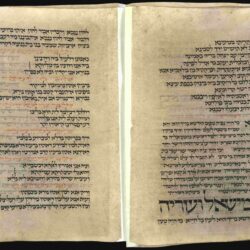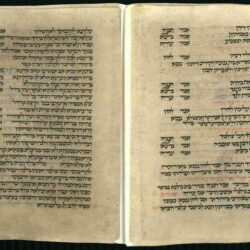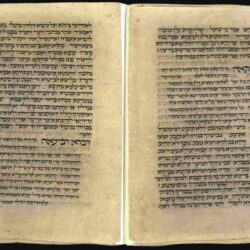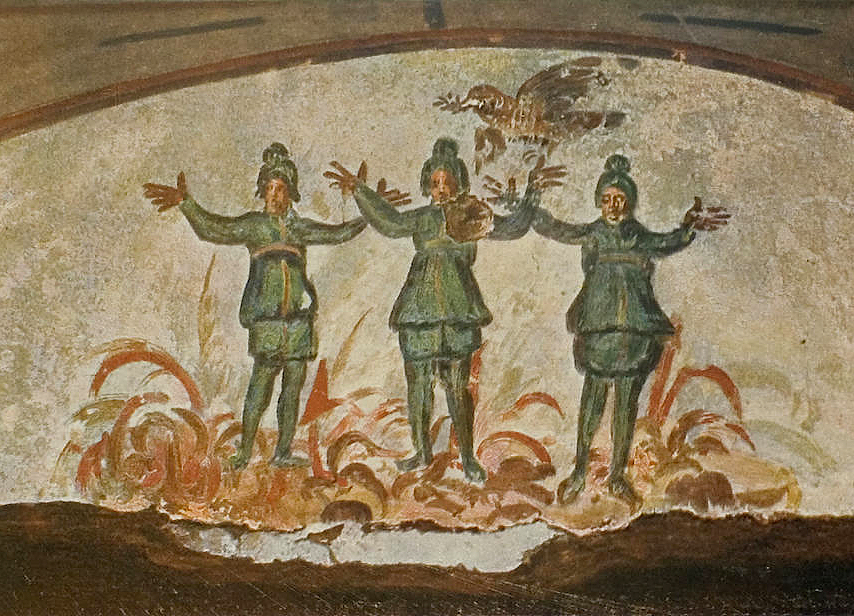This piyyut, “Ḥanaiah, Mishael, and Azariah,” was originally written to be recited as an introduction to the targum of the Second Commandment, the prohibition on worshiping other gods. It is a dispute-poem retelling the story of Ḥanaiah, Mishael, and Azariah, the three “holy children” of Daniel chapter 3 who would rather be thrown into an oven than worship an idol. It’s an intricate multi-part acrostic that I absolutely love. (I also am partially convinced it may be influenced by the apocryphal “Song of the Three Holy Children,” if not in context then in the idea of an extensive poem related to their story.) Since the original poem’s acrostic only goes halfway through the alphabet, the great Meir bar Isaac Nehorai of Orleans wrote a continuation that is also included here.
The text included here is a synthesis of that recorded in Sokoloff and Yahalom’s “Jewish Palestinian Aramaic Poetry from Late Antiquity” and that recorded in the Goldschmidt maḥzor for Shavuot. Although the text doesn’t match precisely with that found in Maḥzor Worms, I’ve still seen fit to include the portion of Maḥzor Worms in which it appear, if only for its beauty as an example of medieval scribal practice.
| Source (Hebrew) | Translation (English) |
|---|---|
|
חֲנַנְיָה מִישָׁאֵל וַעֲזַרְיָה אוֹדְעוּ שְׁמֵיהּ דְּקוּדְשָׁא בְּרִיךְ הוּא
לְעֵין כׇּל־חַיָּיא כַּד־טְעֵין לְהוֹן נַנָּסָא וְהַכְּדֵין אֲמַר לְהוֹן׃ |
Ḥananiah, Mishael, and Azariah proclaimed the name of the blessed Holy One
before the eyes of all life, when the dwarf[1] Nebuchadnezzar, based on an interpretation of Daniel 4:14’s “the lowest of men.” charged them and thus said to them:[2] These first two lines, found in most if not all medieval Ashkenazi manuscripts, are not found in the original Byzantine-era piyyuṭ (as compiled by Sokoloff and Yahalom, SYAP 13). |
|
אִיתוּ כרוֹעוּ לְצִלְמִי לוּלַבֵּי דְתָמָר אֲמַר לְהוֹן נַנָּסָא[3] The original Byzantine-era piyyuṭ (as compiled by Sokoloff and Yahalom, SYAP 13), begins here.
אִתְבּוֹנְנוּ מַה עֲבֵדִית לְכוֹן עַד דְּאַתּוּן בְּצִיּוֹן אֲמַר לְהוֹן נַנָּסָא אַרְמַיִית שְׁמָמָה[4] Some say צַדְיָא, which is equivalent in meaning. בְּגוֹ בֵית גְּנוּנֵיהּ דְּקִירִיס דִּדְכוֹן אֲמַר לְהוֹן נַנָּסָא אִית לָן פַּטְרִין שְׁמֵיהּ לֹא־יָנוּם וְלֹא־יִישָׁן[5] Some do not say וְלֹא־יִישָׁן צְוַחוּ תְלָתֵהוֹן׃ |
Come, bow down to my image, palm-fronds![6] A reference to the three youths, who remained tall instead of bending over See Targum Song of Songs 7:9. — said the dwarf.
Understand what I did to you when You were in Zion. — said the dwarf. I set waste in the baldachin of your Master! — said the dwarf. We have a Patron whose name is “Neither slumbers nor sleeps!”[7] Psalm 121:4. Many manuscripts do not say “nor sleeps” and just read “Does Not Slumber!” — shouted those three. |
|
בַּאֲבוּנָן דִּלְעֵיל הוּא רׇחְצִנָן אֲמַר חֲנַנְיָה
בֵּיהּ אֲנַן רְחִצִין מִן־טַלְיוּתַן אֲמַר מִישָׁאֵל בְּנוּרָא אֲנַן יָקְדִין וּבֵיהּ לָא־כָפְרִין אֲמַר עֲזָרְיָה אֲנַן לָא כָפְרִין בְּלָא־יִהְוֵי לְכוֹן[8] Some say לָךְ צְוַחוּ תְלָתֵהוֹן׃ |
In our Parent above we trust. — said Hanaiah.
In Them we have trusted from our youth. — said Mishael. We would burn in the fire rather than deny Them. — said Azariah. We will not deny “Do not have for yourselves!”[9] i.e. the second commandment, pluralized. Some texts re-singularize the Aramaic to “Do not have for yourself.” — shouted those three. |
|
גָּרְמִין אַתּוּן גַּרְמֵיכוֹן לְמֵיקוֹד אֲמַר לְהוֹן נַנָּסָא
גּוּפֵיכוֹן יִתְעֲבְדוּן קְטַם בְּגוֹ אַתּוּן נוּרָא אֲמַר לְהוֹן נַנָּסָא גְּבוּרָה וְדִינָמִיס אִי אִית לֶאֱלָהֲכוֹן הוּא יְשֵׁזְבִינְכוֹן אֲמַר לְהוֹן נַנָּסָא אִית לָן פַּטְרִין שְׁמֵיהּ לֹא־יָנוּם וְלֹא־יִישָׁן צְוַחוּ תְלָתֵהוֹן׃ |
You are causing yourselves to be burned! — said the dwarf.
Your bodies will be made ash in the fiery oven. — said the dwarf. If your God has strength and dynamism, let Them save you! — said the dwarf. We have a Patron whose name is “Neither slumbers nor sleeps!” — shouted those three. |
|
דְּחִילוּתָא דְּצִלְמָךְ לֵית הִיא בְּלִיבַּן אֲמַר חֲנַנְיָה
דְּמוּת דְּצֶלֶם לֵית אֲנַן פָּלְחִין אֲמַר מִישָׁאֵל דַּע דְּפַטְרוֹנַן תֵּיאוֹרוֹן יָתָךְ אֲמַר עֲזָרְיָה אֲנָן לָא כָפְרִין בְּלָא־יִהְוֵי לְכוֹן צְוַחוּ תְלָתֵהוֹן׃ |
Reverence for your image is not in our heart! — said Hanaiah.
The form of an image we do not worship! — said Mishael. Know that our Patron is watching over you! — said Azariah. We will not deny “Do not have for yourselves!” — shouted those three. |
|
הֵיךְ כָּפְרִתוּן בִּי דְּלָא לְמִיסְגֹד[10] Some say לְמִכְרוֹעַ, which is equivalent in meaning. לְצִלְמִי אֲמַר לְהוֹן נַנָּסָא
הָאִידְנָא אַתּוּן כָּרְעִין קֳדָם אִנְטַרְטִי וְאִי לָא יָקְדִין אֲמַר לְהוֹן נַנָּסָא הָא אִית לְכוֹן לְמֵידַע דְּאַתּוּן כָּרְעִין דְּלָא בְּטֵיבַתְכוֹן אֲמַר לְהוֹן נַנָּסָא אִית לָן פַּטְרִין שְׁמֵיהּ לֹא־יָנוּם וְלֹא־יִישָׁן צְוַחוּ תְלָתֵהוֹן׃ |
How you are deniers, not to bow down to my image! — said the dwarf.
Now you will bow before my effigy, and if not, burn! — said the dwarf. Hey, you have to know you will bow even against your will! — said the dwarf. We have a Patron whose name is “Neither slumbers nor sleeps!” — shouted those three. |
|
וּמָה אֲנַן אָמְרִין לְדַר[11] Some say לֶאֱלָהָא בִּשְׁמַיָּא אֲמַר חֲנַנְיָה
וְהוּא גָּלֵי עַמִּיקָתָא וּמְסַתְּרָתָא אֲמַר מִישָׁאֵל וְעִימֵּיהּ שְׁרֵא נְהוֹרָא וַחֲשׁוֹכָא לֵיהּ גַּלְיָא אֲמַר עֲזָרְיָה אֲנָן לָא כָפְרִין בְּלָא־יִהְוֵי לְכוֹן צְוַחוּ תְלָתֵהוֹן׃ |
And what would we say to the Dweller[12] Some manuscripts read, “the God” in heaven? — said Hanaiah.
And They reveal mysteries and secrets! — said Mishael. And with Them are beams of light, and They reveal darkness! — said Azariah. We will not deny “Do not have for yourselves!” — shouted those three. |
|
זָרֵיק אֲנָא יַתְכוֹן לְגוֹ אַתּוּן נוּרָא מְכַפְּתִין אֲמַר לְהוֹן נַנָּסָא
זָעֵיף אֲנָא עֲלֵיכוֹן דְּאַתּוּן מָרְדִין בִּי וּבְצִלְמִי אֲמַר לְהוֹן נַנָּסָא זְמַן דִּי תִּשְׁמְעוּן קָל קַרְנָא[13] Some add מַשְׁרוֹקִיתָא מְמַלְּלָא כּרְוֹעוּ קֳדָם צִלְמִי אֲמַר לְהוֹן נַנָּסָא אִית לָן פַּטְרִין שְׁמֵיהּ לֹא־יָנוּם וְלֹא־יִישָׁן צְוַחוּ תְלָתֵהוֹן׃ |
I am throwing you, bound, into the fiery furnace! — said the dwarf.
I am angry at you that you rebel against me and my image! — said the dwarf. When you hear the sound of the horn,[14] Some manuscripts add “pipe” bow before my image! — said the dwarf. We have a Patron whose name is “Neither slumbers nor sleeps!” — shouted those three. |
|
חַי וְקַיָּים הוּא פַּטְרוֹן דִּידַן אֲמַר חֲנַנְיָה
חֲבֵל עַל־בְּנִין דְּכָפְרִין בַּאֲבוּהוֹן אֲמַר מִישָׁאֵל חָס לַן דְּנִכְפּוֹר בְּנַעֲשֶׂה וְנִשְׁמָע אֲמַר עֲזָרְיָה אֲנָן לָא כָפְרִין בְּלָא־יִהְוֵי לְכוֹן צְוַחוּ תְלָתֵהוֹן׃ |
The Living and Enduring One is our Patron! — said Hanaiah.
Shame on the children who deny their Parent! — said Mishael. Far be it for us to deny “We will do and hear!”[15] Exodus 24:7 — said Azariah. We will not deny “Do not have for yourselves!” — shouted those three. |
|
טַבְחִית וְנַכְסִית גוֹזְלַיָּא בְּצִיּוֹן אֲמַר לְהוֹן נַנָּסָא
טָיֵּיס וְנָהֵים הֲוֵינָא כְּאַרְיָא בְּגוֹ בֵית גְּנוּנֵיהּ דְּקִירִיס דִּידְכוֹן אֲמַר לְהוֹן נַנָּסָא טַלֵּקִית רֵישֵׁי מִיַנְקֵיכוֹן וְלָא־פָרֵיק יַתְכוֹן אֲמַר לְהוֹן נַנָּסָא אִית לָן פַּטְרִין שְׁמֵיהּ לֹא־יָנוּם וְלֹא־יִישָׁן צְוַחוּ תְלָתֵהוֹן׃ |
I have butchered and slaughtered Zion’s fledglings! — said the dwarf.
Fast and roaring was I like a lion in the baldachin of your Master! — said the dwarf. I tossed aside the heads of your babies, and none saved them! — said the dwarf. We have a Patron whose name is “Neither slumbers nor sleeps!” — shouted those three. |
|
יֵוַוי[16] Some say יֵיתֵי וַוי, which is more or less equivalent in meaning. עֲלָךְ נַנָּסָא מַה אַתְּ מְחָרַף אֲמַר חֲנַנְיָה
יְלֵיף מִן־פַּרְעֹה דְקַדְמוֹי מִינָּךְ אֲמַר מִישָׁאֵל יָחִיד הוּא אֱלָהָן תֵּיאוֹרוֹ יָתָן אֲמַר עֲזָרְיָה אֲנָן לָא כָפְרִין בְּלָא־יִהְוֵי לְכוֹן צְוַחוּ תְלָתֵהוֹן׃ |
Woe betide you, dwarf, how you blaspheme! — said Hanaiah.
Learn from Pharaoh who was before you. — said Mishael. Unique is our God who watches over us! — said Azariah. We will not deny “Do not have for yourselves!” — shouted those three. |
|
כׇּל־יָתְבֵי אַרְעָא מִינִּי נִכְבְּשׁוּ וְנֶאֶלְמוּ[17] Some say כּוּלָּא אֲנָא מְמַלְּלָא עֲלֵיכוֹן לְחֵירוּ אֲמַר לְהוֹן נַנָּסָא
כׇּל־סִנְקְלֵיטִין דִּידִי קְיָימִין[18] Some say קוֹדִין וְכָרְעִין קֳדָם צִלְמִי וְאִינִשׁ לָא מָרֵד אֲמַר לְהוֹן נַנָּסָא כְּמָה דְּאַתּוּן קַשְׁיָין עׇרְפָא[19] Some say כֵּירִיס אַתּוּן בְּרָמוּת רוּחֲכוֹן דְּלָא־לְמִיכְרֹעַ לְצִלְמִי אֲמַר לְהוֹן נַנָּסָא אִית לָן פַּטְרִין שְׁמֵיהּ לֹא־יָנוּם וְלֹא־יִישָׁן צְוַחוּ תְלָתֵהוֹן׃ |
All the earth’s residents are conquered and struck dumb by me![20] Some manuscripts read “All I say of you is that you are free.” — said the dwarf.
All my senators appear[21] Some manuscripts read “kneel and bow” before my image and not a man rebels! — said the dwarf. How stiff-necked are you[22] Some manuscripts read “Doomed are you for your haughty spirits” not to bow to my image! — said the dwarf. We have a Patron whose name is “Neither slumbers nor sleeps!” — shouted those three. |
|
לָֽא־חַשְׁחִ֨ין אֲנַ֧חְנָא עַל־דְּנָ֛ה פִּתְגָ֖ם לַהֲתָבוּתָֽךְ׃[23] Some say לֵית אֲנַן מַשְׁגִּיחִין עֲלָךְ ועַל־צִלְמָךְ אֲמַר חֲנַנְיָה
לֵית לָן חִישּׁוּק[24] Some say חוּלַּק בֶּאֱלָהָא דְּבַר אֵינָשׁ צַיְירֵיהּ[25] Some say שַׁפְכֵּיהּ אֲמַר מִישָׁאֵל לֶאֱלָהָנָא אֲנַן פָּלְחִין וְסַגְדִין דְּאַעְבָּר יָתָנָא בְּגוֹ יַמָּא בְּיַבִּישְׁתָּא[26] Some say לְזֶה אֵלִי דִּזְמַרִינַן בְּיַמָּא אֲנַחְנָא דִילֵיהּ אֲמַר עֲזָרְיָה אֲנָן לָא כָפְרִין בְּלָא־יִהְוֵי לְכוֹן צְוַחוּ תְלָתֵהוֹן׃ |
We need not answer you on this matter.[27] A direct quote from Daniel 3:16. Some manuscripts read “We are not watching out for you or for your image.” — said Hanaiah.
We have no desire in[28] Some manuscripts read “portion” a god that a human formed.[29] Some manuscripts read “cast” — said Mishael. To our God, who passed us through the sea on dry land, we worship and bow.[30] Some manuscripts read “As we sang at the sea, we are of ‘this, our God!’” referring to Exodus 15:2. — said Azariah. We will not deny “Do not have for yourselves!”[31] The original anonymous text ends here. — shouted those three. |
|
מֵישַׁךְ שַׁדְרַךְ וַעֲבֵד נְגוֹ אֲמַר לְהוֹן נַנָּסָא[32] R. Meir b. R. Yitzḥaq (better known for writing Aqdamut Milin) wrote a rhyming conclusion, largely based on the dispute as recorded in Leviticus Rabbah 33:6
מִדְּאוֹרַיתָא דְמֹשֶׁה אִסְתַּכְּלוּ וַהֲגוֹ אֲמַר לְהוֹן נַנָּסָא מִבַּדְּרִיתוּ וּפְלִחִיתוּ סְמַי וְלָא־סַגוֹ אֲמַר לְהוֹן נַנָּסָא אִית לָן פַּטְרִין שְׁמֵיהּ לֹא־יָנוּם וְלֹא־יִישָׁן צְוַחוּ תְלָתֵהוֹן׃ |
Meshach, Shadrach, and Abednego![33] The Babylonian names given to the three as part of the process of forced assimilation in Daniel 1:7. Hananiah is Shadrach, Mishael is Meshach, and Azariah is Abednego. Though chapter 3 of Daniel almost exclusively uses these Babylonian names, and thus Christians often refer to the three as “Shadrach, Meshach, and Abednego,” Jewish texts generally use the Hebrew names. — said the dwarf.
From the Teaching of Moses look and consider![34] According to Leviticus Rabbah 33:6, Nebuchadnezzar cited Deuteronomy 4:28 as a proof text: “There you will serve gods, the work of human hand.” — said the dwarf. You are scattered and worshipped something secret,[35] i.e. incorporeal. An ancient canard against the Jews, less common now that monotheism is much more prominent worldwide, is that we’re all secretly atheists because we don’t know what our God looks like. not great! — said the dwarf. We have a Patron whose name is “Neither slumbers nor sleeps!” — shouted those three. |
|
נַחְנָא נְהִירִין זְהִירִין בִּקְיָמֵי אֲמַר חֲנַנְיָה
נָטוֹרֵי פוּם מַלְכָּא בְּמוֹמֵי אֲמַר מִישָׁאֵל נֵיתִיב גּוּלְגְּלֵי אַרְנוֹנֵי וְזִימֵי אֲמַר עֲזָרְיָה אֲנָן לָא כָפְרִין בְּלָא־יִהְוֵי לְכוֹן צְוַחוּ תְלָתֵהוֹן׃ |
We are careful to recall the covenants. — said Hanaiah.
Our vow was to guard the word of a king. — said Mishael. We pay per-capita taxes, property-taxes, and damages![36] According to Leviticus Rabbah 33:6, the three responded to the citation of Deuteronomy 4:28 by saying it referred to obeying kings in exile, since kings are treated “like gods.” — said Azariah. We will not deny “Do not have for yourselves!” — shouted those three. |
|
סַפַּקְתּוּן בְּאַרְעֲכוֹן טְפוּסֵי דְמִשְׁתַּמּוֹדְעִין מִיהוּדָאֵי אֲמַר לְהוֹן נַנָּסָא
סַמָּנִין צַיֵּירִיתוּן בְּכוֹתְלֵי צִלְמֵי כַשְׂדָּאֵי אֲמַר לְהוֹן נַנָּסָא סְבַרִיתוּן הָכָא לְמֵיעֲבַד צִלְמִי הַצְדָאֵי אֲמַר לְהוֹן נַנָּסָא אִית לָן פַּטְרִין שְׁמֵיהּ לֹא־יָנוּם וְלֹא־יִישָׁן צְוַחוּ תְלָתֵהוֹן׃ |
You filled your land with images belonging to apostates from the Jews! — said the dwarf.
Pigments you formed on the walls, images of Chaldeans![37] Find Ezekiel 23:14 — said the dwarf. Now you think to render nothingness to my image? — said the dwarf. We have a Patron whose name is “Neither slumbers nor sleeps!” — shouted those three. |
|
עַל־דְּנָא לַהֲתָבוּתָךְ אֲנַן לָא חַשְׁחִין אֲמַר חֲנַנְיָה
עִילָּאָה יָכִיל לְשֵׁיזָבוּתַנָא מִן־יְדָךְ וּמֵאַתּוּן שְׁחִין אֲמַר מִישָׁאֵל עָבִיד וְלָא־עָבִיד עַל־שְׁמֵיהּ נִתָּרְמֵי פַשְׁחִין אֲמַר עֲזָרְיָה אֲנָן לָא כָפְרִין בְּלָא־יִהְוֵי לְכוֹן צְוַחוּ תְלָתֵהוֹן׃ |
Upon this, we need not answer you. — said Hanaiah.
The Highest can save us from your hand and from the erupting oven. — said Mishael. Whether They act or not, Their name we will exalt aflame. — said Azariah. We will not deny “Do not have for yourselves!” — shouted those three. |
|
פְּסָקֵי וּרְגוּשֵׁי אַסְגִּיתוּ לְצָדוּ וְתוֹבוּ אֲמַר לְהוֹן נַנָּסָא
פָּרִיסְנָא לְכוֹן וִילוֹן פִּיתְּקֵי שְׁקוֹלוּ וּכְתוֹבוּ אֲמַר לְהוֹן נַנָּסָא פִּיקוּדַי לְמִיטַּר לִתְלָתִין יוֹמִין תוּבוּ אֲמַר לְהוֹן נַנָּסָא אִית לָן פַּטְרִין שְׁמֵיהּ לֹא־יָנוּם וְלֹא־יִישָׁן צְוַחוּ תְלָתֵהוֹן׃ |
You multiplied mobs of cults to nothingness and waste! — said the dwarf.
I’m spreading a curtain for you — take notes and write — said the dwarf. That you will keep my orders, returing in thirty days. — said the dwarf. We have a Patron whose name is “Neither slumbers nor sleeps!” — shouted those three. |
|
פִּיתְּקָא קַמָּא אִם־אַנְשֵׁינַן שׁוּם אֱלָהָנָא אֲמַר חֲנַנְיָה
פְּרוֹז דּוֹגְמָא תִּנְיָנָא הֲלָא יְהֹוָה יִבְדּוֹק דְּנָא אֲמַר מִישָׁאֵל פָּרֵישׁ יְאוּת אֲרֵי עֲלָךְ אִתְקְטַלְנָא אֲמַר עֲזָרְיָה אֲנָן לָא כָפְרִין בְּלָא־יִהְוֵי לְכוֹן צְוַחוּ תְלָתֵהוֹן׃ |
The first note: “If we forget our God’s name!” — said Hanaiah.
The second letter inscribed: “Wouldn’t God investigate this?” — said Mishael. Clearly written: “For You we are killed!”[38] Each of the three notes cites one of the verses from Psalms 44:21–23. — said Azariah. We will not deny “Do not have for yourselves!” — shouted those three. |
|
צָרוֹפִינְּהוּ וְיַהְבִינְּהוּ לְיָנוּקָא לְמִיקְרִינְּהוּ בְחֵילפְּקַד לְהוֹן נַנָּסָא
צַוְחִינְּהוּ פְרוֹס כׇּל־אוּמֵּי וְקוֹמֵי כׇל־חֵיל צְלֵם אַנְפּוֹהִי אִישְׁתַּנִּי בְּנַס וּקְצַף שַׂגִּיא חֵיל אִית לָן פַּטְרִין שְׁמֵיהּ לֹא־יָנוּם וְלֹא־יִישָׁן צְוַחוּ תְלָתֵהוֹן׃ |
“Gather them and give them to a child to read them aloud!” — ordered the dwarf.
He read them publicly, before all the nations and all the army. His face’s appearance changed in roaring frothing rage. We have a Patron whose name is “Neither slumbers nor sleeps!” — shouted those three. |
|
צַרְצָדָא כַּדָא לְכַּלְבָּא שָׁוֵית לְאִיבָּזוֹיֵי אֲמַר חֲנַנְיָה
צָבֵינַן רְבוּתָא דְּקַדִּישׁ וָעִיר לְאַחְזוֹיֵי אֲמַר מִישָׁאֵל צְתוּתַן בְּמֵיזֵי שִׁבְעָא עַל־דִּחֲזֵי לְמֵיזְיֵיהּ אֲמַר עֲזָרְיָה אֲנָן לָא כָפְרִין בְּלָא־יִהְוֵי לְכוֹן צְוַחוּ תְלָתֵהוֹן׃ |
Like a cricket, flask, and dog[39] Leviticus Rabbah 33:6 compares Nebuchadnezzar’s name to a barking [navaḥ] dog, an inflating flask [kad], and a chirping [natsar] cricket. you are to be shamed! — said Hanaiah.
We wish the greatness of the holy Watcher[40] Find Daniel 4:10 to be seen! — said Mishael. Burn us at the seventh level, as hot as can be! — said Azariah. We will not deny “Do not have for yourselves!” — shouted those three. |
|
קְרָא דְיִרְמְיָה רֵישֵׁיהּ לְבַטּוֹלֵי שְׁרֵיתוּן אֲמַר לְהוֹן נַנָּסָא
קַיּוֹמֵי סֵיפֵיהּ צָבֵינָא דְּבֵי מָרוֹדֵי הִתְגָּרִיתוּן אֲמַר לְהוֹן נַנָּסָא קְרָא לְגִיבָּרִין דִּבְחַיְלֵיהּ לְמִיכְפְּתִינְּהוּ לְמִירְמִינְּהוּ לְאַתּוּן אֲמַר לְהוֹן נַנָּסָא אִית לָן פַּטְרִין שְׁמֵיהּ לֹא־יָנוּם וְלֹא־יִישָׁן צְוַחוּ תְלָתֵהוֹן׃ |
The former part of Jeremiah’s verse you’ve settled to cancel.[41] Referring to Jeremiah 27:8’s warning about those who refuse to obey Nebuchadnezzar. — said the dwarf.
I wish to fulfill the latter, since you rebelliously provoked me. — said the dwarf. Call the men in the army to force them and cast them into the oven! — said the dwarf. We have a Patron whose name is “Neither slumbers nor sleeps!” — shouted those three. |
|
רַבָּנוּתָא בַּסַכַּנְתָּא לָא שְׁנוֹ בְּסַרְבָּלָא פַּשְׁטָא וְכַרְבְּלָא
רְמִיו לְגוֹ אַתּוּן נוּרָא כְּפִיתִין וְלָא אִינְזְקוּ בְּחֲבָלָא רֵיחַ נוּר לָא עֲדָת בְּהוֹן וּבְגוּשְׁמֵיהוֹן לָא־שְׁלֵט הַבְלָא׃ |
The endangered great ones were unchanged in mantle, coat, and cap.
They were thrown into the fiery oven, but were undamaged by injury. The smell of fire didn’t come upon them[42] A direct quote from Daniel 2:27 — heat did not rule their bodies. |
|
שְׁלַח מְלַךְ תַּקִיף מַלְאֲכָא דְּטָאֵיס עָלְמָא בִּתְרֵין טַיְסֵי
שְׁגַר מִלְּבָר וְאַצֵּין מִלְּגיו וַעֲבַד נִיסֵּי בְגוֹ נִיסֵּי שִׁיתָּא אִיתְעַבִּידוּ בֵּיהּ בְּיוֹמָא דְאִיתְנַסִּיאוּ הוֹגֶנֵיסֵי׃ |
The Mighty Sovereign sent the angel that flies through the world in two flights.[43] Gabriel. Find Bavli Berakhot 4b
He turned it up on the outside and cooled it on the inside, and did miracles within miracles.[44] A reference to Pesaḥim 118a-b Six were done on that very day that the well-born ones were tested.[45] Sanhedrin 92b. According to the passage, the six miracles were: the furnace rose from the ground, the furnace was breached, the limestone dissolved, the image fell on its face, four monarchies were burned, and Ezekiel revived the dead in the Dura Valley. |
|
תְּוָהּ נַנָּסָא וְקָם בְּהִתְבְּהָלָא כַּד חֲמָא אַרְבַּע שְׁרַייִן מְהַלְכִין
תֵּיתוּ וּפוּקוּ עַבְדּוֹהִי דֵאלָהָא עִילָּאָה מֶלֶךְ מַלְכֵי מַלְכִין תִּמְהוֹהִי וְאָתוֹהִי אִישְׁתָּעוּ דְרַבְרְבְנִין נִצְחָנוֹי בְּקִרְוֵי פִּלְכִין׃ |
The dwarf was terrified and rose in panic when he saw four unbound and walking.
“Go and take out the servants of the highest God, Sovereign, Soveriegn of sovereigns! Tell of Their wonders and signs, for great are Their victories in the provinces’ cities!”[46] There might be an implied refrain of “— said the dwarf” for these two lines, but to my knowledge it is unattested. |
|
שַׁבְּחוּ קֳדָם יְהֹוָה כׇּל־עַמְמַיָּא אֲמַר חֲנַנְיָה
שַׁבְּחוּנֵיהּ כׇּל־אוּמַּיָּא אֲמַר מִישָׁאֵל אֲרֵי תְקֵיף עֲלָן טוּבֵיהּ דְּבִשְׁמַיָּא אֲמַר עֲזָרְיָה וְקוּשְׁטָא דַיהֹוָה לְעָלְמַיָּא אֲמַר גַּבְרִיאֵל׃ |
Praise before the Cause, all peoples! — said Hanaiah.
Praise Them, all nations! — said Mishael. For great over us is Their goodness in heaven — said Azariah. And the truth of the Cause is eternal![47] An Aramaic translation of Psalms 117 in its entirety. The word “in heaven” is added for the sake of the rhyme. — said Gabriel. |
|
טוּבֵיהוֹן צַדִּיקַיָּא דְּעַל שְׁמֵיהּ דְּקוּדְשָׁא בְּרִיךְ הוּא רְחִיצִין
דִּבְקִילּוּסֵיהוֹן וּבִשְׁבָחֵיהוֹן לְמַלְאֲכֵי שִׁימוּשָׁא נְחִיצִין וּלְעָתִיד לְגוֹ מִינְּהוֹן קָמֵי שְׁכִינְתָּא נָיְיחִין בִּמְחִיצִין׃ |
Content are the righteous who trust in the name of the blessed Holy One.
For in their plaudits and their praises the ministering angels rush.[48] The angels above don’t begin their song until Israel below does. Ḥullin 91b And in the future, within from them,[49] i.e. in the innermost part of the precincts, more so than the angels. Some manuscripts amend this odd phrasing to “in their number” before the Presence they dwell in the precincts. |
Source(s)
Notes
| 1 | Nebuchadnezzar, based on an interpretation of Daniel 4:14’s “the lowest of men.” |
|---|---|
| 2 | These first two lines, found in most if not all medieval Ashkenazi manuscripts, are not found in the original Byzantine-era piyyuṭ (as compiled by Sokoloff and Yahalom, SYAP 13). |
| 3 | The original Byzantine-era piyyuṭ (as compiled by Sokoloff and Yahalom, SYAP 13), begins here. |
| 4 | Some say צַדְיָא, which is equivalent in meaning. |
| 5 | Some do not say וְלֹא־יִישָׁן |
| 6 | A reference to the three youths, who remained tall instead of bending over See Targum Song of Songs 7:9. |
| 7 | Psalm 121:4. Many manuscripts do not say “nor sleeps” and just read “Does Not Slumber!” |
| 8 | Some say לָךְ |
| 9 | i.e. the second commandment, pluralized. Some texts re-singularize the Aramaic to “Do not have for yourself.” |
| 10 | Some say לְמִכְרוֹעַ, which is equivalent in meaning. |
| 11 | Some say לֶאֱלָהָא |
| 12 | Some manuscripts read, “the God” |
| 13 | Some add מַשְׁרוֹקִיתָא |
| 14 | Some manuscripts add “pipe” |
| 15 | Exodus 24:7 |
| 16 | Some say יֵיתֵי וַוי, which is more or less equivalent in meaning. |
| 17 | Some say כּוּלָּא אֲנָא מְמַלְּלָא עֲלֵיכוֹן לְחֵירוּ |
| 18 | Some say קוֹדִין וְכָרְעִין |
| 19 | Some say כֵּירִיס אַתּוּן בְּרָמוּת רוּחֲכוֹן |
| 20 | Some manuscripts read “All I say of you is that you are free.” |
| 21 | Some manuscripts read “kneel and bow” |
| 22 | Some manuscripts read “Doomed are you for your haughty spirits” |
| 23 | Some say לֵית אֲנַן מַשְׁגִּיחִין עֲלָךְ ועַל־צִלְמָךְ |
| 24 | Some say חוּלַּק |
| 25 | Some say שַׁפְכֵּיהּ |
| 26 | Some say לְזֶה אֵלִי דִּזְמַרִינַן בְּיַמָּא אֲנַחְנָא דִילֵיהּ |
| 27 | A direct quote from Daniel 3:16. Some manuscripts read “We are not watching out for you or for your image.” |
| 28 | Some manuscripts read “portion” |
| 29 | Some manuscripts read “cast” |
| 30 | Some manuscripts read “As we sang at the sea, we are of ‘this, our God!’” referring to Exodus 15:2. |
| 31 | The original anonymous text ends here. |
| 32 | R. Meir b. R. Yitzḥaq (better known for writing Aqdamut Milin) wrote a rhyming conclusion, largely based on the dispute as recorded in Leviticus Rabbah 33:6 |
| 33 | The Babylonian names given to the three as part of the process of forced assimilation in Daniel 1:7. Hananiah is Shadrach, Mishael is Meshach, and Azariah is Abednego. Though chapter 3 of Daniel almost exclusively uses these Babylonian names, and thus Christians often refer to the three as “Shadrach, Meshach, and Abednego,” Jewish texts generally use the Hebrew names. |
| 34 | According to Leviticus Rabbah 33:6, Nebuchadnezzar cited Deuteronomy 4:28 as a proof text: “There you will serve gods, the work of human hand.” |
| 35 | i.e. incorporeal. An ancient canard against the Jews, less common now that monotheism is much more prominent worldwide, is that we’re all secretly atheists because we don’t know what our God looks like. |
| 36 | According to Leviticus Rabbah 33:6, the three responded to the citation of Deuteronomy 4:28 by saying it referred to obeying kings in exile, since kings are treated “like gods.” |
| 37 | Find Ezekiel 23:14 |
| 38 | Each of the three notes cites one of the verses from Psalms 44:21–23. |
| 39 | Leviticus Rabbah 33:6 compares Nebuchadnezzar’s name to a barking [navaḥ] dog, an inflating flask [kad], and a chirping [natsar] cricket. |
| 40 | Find Daniel 4:10 |
| 41 | Referring to Jeremiah 27:8’s warning about those who refuse to obey Nebuchadnezzar. |
| 42 | A direct quote from Daniel 2:27 |
| 43 | Gabriel. Find Bavli Berakhot 4b |
| 44 | A reference to Pesaḥim 118a-b |
| 45 | Sanhedrin 92b. According to the passage, the six miracles were: the furnace rose from the ground, the furnace was breached, the limestone dissolved, the image fell on its face, four monarchies were burned, and Ezekiel revived the dead in the Dura Valley. |
| 46 | There might be an implied refrain of “— said the dwarf” for these two lines, but to my knowledge it is unattested. |
| 47 | An Aramaic translation of Psalms 117 in its entirety. The word “in heaven” is added for the sake of the rhyme. |
| 48 | The angels above don’t begin their song until Israel below does. Ḥullin 91b |
| 49 | i.e. in the innermost part of the precincts, more so than the angels. Some manuscripts amend this odd phrasing to “in their number” |





